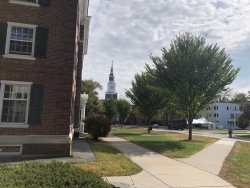Tips on Finding the Right College for You
Recently, I've had the pleasure of talking to a few prospective students through Dartmouth Admissions. After sharing my experiences and fielding questions on virtual panels and high school visits, I'm reminded of my own college process. I remember feeling anxious, stressed and confused during my entire senior fall, and looking back, these feelings distracted me from truly discovering what each university was like. While I'm grateful to have loved my time at Dartmouth so far, I now realize that there's so much about Dartmouth I didn't know when I was applying. Fortunately, in my case this means that I got to enjoy many happy surprises during my first year at Dartmouth. However, I do advise taking the alternate approach of really learning about your school before you commit. To help you do so, I've recorded some advice that I would give myself when I was applying.

First of all, ask about average course load and class size! While I know questions such as "Tell me more about X major" are very popular, something I didn't give much consideration to was the average course load of a student. At Dartmouth, we're on a quarter system and so most students take 3 classes a term, which means that while you don't have to focus on many subjects at a time, these classes move very fast. Since I have a fast-paced learning style, I've really enjoyed Dartmouth's academic schedule. At other schools, students might take more classes, especially if they're on a semester system. In this case, you would have to focus on 5-7 subjects (depending on the school) a term, but the semester would last for a few more months than our quarters. You should also ask about class size, as that will also affect the teaching style implemented. Do you like learning through lectures, or do you like actively participating with your professor and peers? Of course, there isn't a perfect course load or class size as everyone's learning preferences are different. However, it's important to consider these things when choosing a school. While it's a very happy coincidence that Dartmouth's quarter system has been perfect for me, my lack of research could have definitely stuck me in a different system that I appreciated less.
Next, find out about the nearby area! When I was applying to college, I made sure to find out if each school was in a city or not. However, I didn't do much more research on top of that. I would definitely advise looking at specific options for leisure, dining and transportation at each school. It might also be helpful to look at the cultures of each area. While New York and San Francisco might both be classified as big cities, studying and living in each place is wildly different. While Hanover is a college town, I didn't know about nearby mountains for hiking and skiing until I arrived at Dartmouth. Skiing in Vermont was a highlight of my winter term, and I didn't even know that was an option when I applied! Classifying a school as in a city or not is a massive oversimplification of what life at that school is actually like, and I think it's important to get a feel for the lifestyle and nearby area. Once you've learned about some places you're interested in, mentioning specific locations could also be helpful for your essays!

There are many ways to find out more about a school beyond a quick internet search. Some resources that I wish I took advantage of would be online panels or connecting with a current student. While it's impossible to know for certain how you would fit at a school without actually enrolling, learning about some of the things I mentioned definitely goes a long way. While you might care more about if a certain class is available right now, you'll probably be thinking more about what you can do with your friends on a weekend or what your class environment is like once you become a college student.















